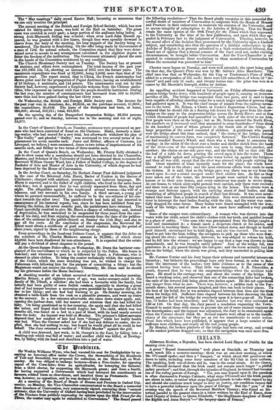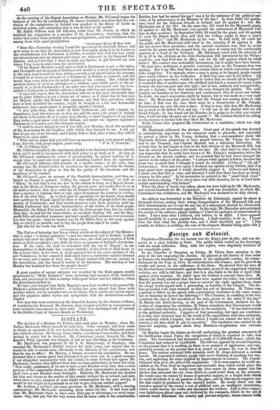IRELAND.
Alderman Keshan, a Repealer, has been elected Lord Mayor of Dublin for the ensuing civic year.
A great " Repeal demonstration" took place at Dundalk, on Thursday lad week, much like a monster-meeting: there was an out-door meeting, at which Mr. O'Connell spoke; and then a" banquet," at which about 600 gentlemen sat down to table, including some forty members of the '82 Club in their uniform. The speaking, both out-of-doors and in, was in the usual strain. At the dinner, Mr. O'Connell declared that the Irish could not remain much longer " a pitiful paltry province"; and that, through the injustice of England, he hisnsell had become one of the ruling powers of Europe. "Yes, you may depend upon it, the question is often discussed in Foreign Cabinets, what steps O'Connell and the Irish people are about to take, or rather what steps England intends to take with regard to us; and should she continue much longer to deny us justice, our condition cannot fail to have a powerful influence upon the peace of Europe." But the " gem" of the evening was the speech of the Reverend Matthew Tierney; who found an his- torical parallel to the present times in a letter written by the Earl of Essex, then Lord Deputy of Ireland, to Queen Elizabeth, "the illegitimate daughter of Henry the Eighth and Anna Boleyn "—" the lacquey-dame of France."
At the meeting of the Repeal Association on Monday, Mr. O'Connell began the business of the day by contradicting Sir James Graham's assertion that the con- viction of the conspirators in Ireland was quashed in the House of Lords on technical paints, and contending that it was decided on the merits !
Mr. Smith O'Brien read the following letter from Mr. Porter, in which he tendered his resignation as a member of the Association; observing, that the writer had joined them probably, with some precipitation, and had withdrawn from among them with equal precipitation.
" Shelboarne Hotel, 9d May 1845.
"Dear Sir—Yesterday evening I read the speeches at the Dundalk dinner; and SA it seems to me that the Association is now thoroughly pledged by its leaders to the establishment of a Parliament in Dublin, no matter how well and how justly our international and our internal grievances are redressed by the Imperial Par- liament, and as I feel that I have no right any further to put forward my own views, I and leave to retire from the Association.
" If the Repeal Members would make a trial in Parliament to get a fair union, and thousands and thousands of Irishmen now hostile or neutral would assist them in the trial, (audit could be done within a month,) and should fail in the attempt, be I would as warm an advocate of a Parliam i
ent n Dublin as yourself; and you would then early with you the public opinion of the country. But, without the previous failure of such an attempt—i. e. without some visible proof of the ne- cessity, of an Irish Parliament,—I am quite sure that you cannot ever try to es- tablish a Parliament in Dublin without a violent civil war and social revolution. "I especially regret, that the Association will not at this most favourable time use its great influence to get a better act of union; as I think that in that case her Majesty might visit Ireland this summer' and that these questions, which have so long disturbed the country, might be brought to a fair and honourable settlement, and a great career of prosperity opened to Ireland. "I also quite deny, that under an Irish Parliament, and with separate in- dependence, (and the terms are, in fact, one and the same,) the people of Ireland are likely to be better off, or to enjoy more liberty, or more happiness of any kind, than under a good union with Great Britain, and under one supreme legislative Parliament in London over this immense empire.
"I shall be much obliged to you if you will, next Monday, thank the members of the Association for the kindness with which they listened to me. I did my best to put my views forward; and I firmly believe that, after a time, they will be found to bequite right.
"With sincere hopes that you will have no reason to regret your present policy, I am, dear Sir, with great respect, yours truly, J. G. Nr. PORTER." " W. S. O'Brien, Esq."
• Mr. O'Brien remarked, the experiment alluded to in that letter had been already tried, and it would be inconsistent with their policy to go back on it. As long as Mr. O'Connell continued his career of precursorship, he gained nothing by it, except what he must call every species of insulting conduct from his opponents. Mr. O'Connell followed with remarks in a similar strain; at the same time moving that Mr. Porter's letter be inserted on the minutes, and that the thanks of the Association be given to him for the purity of his intentions and the manliness of his conduct.
- Mr. O'Connell gave an account of the Dundalk demonstration; and then en-
Iarjed Repeal in general. Calling. for support from "Orange" as well as
," he said that it was too late in the session to bring on a Repeal discus- sion in the House of Commons during the present year; nor would they do so at all until so backed that they could say all Ireland demanded it. He announced that a number of festivals were to take place throughout the country in celebra- tion of the 30th May. As to their plan of operations for the future they should have petitions for Repeal signed by three or four millions of people before the next session of Parliament; and they should persevere with those petitions until the British Parliament had ocular demonstration of the wishes of the Irish people. Meanwhile, Sir Robert Peel wanted to take the Irish people from him by outbid- • him: he had bid the Glass-duties, an excellent banking bill, and the May: nooth Bill—all excellent measures; • and more equally good measures were promised. Let him bid again: what he wanted was for Sir Robert Peel to bid away against him as quickly as possible, and to buy the people from him if he could. The rent for the week was 4061.
The Nation of Saturday last has a violent article on the subject of the Queen— Who is called "a foreign potentate "—and her rumoured visit to Ireland: a short extract will show the spirit "If the Queen come,. she shall not complain of Irish • deceit or Irish sycophancy; nor shall she leave us ignorant of Ireland's determina- tion. If she come, she shall be welcomed with the cry of 'Repeal': in our thoroughfares it shall make her coursers tremble; in her revels it shall break in like a round shot in her levee it shall approach her in the green uniform of the new Volunteers; in her council it shall reach her—a confederate nation's demand for an army and a senate of their own. Ireland looked with nervous anxiety to the Association and has found it worthy of its functions. The meeting of last Monday has banished fear from the people's heart."
A great number of savage outrages are recorded by the Irish papers) mostly perpetrated by "Molly Maguire's" men; including four murders of the vindictive class, and an attempt to burn a cottage with a poor widow and her children, whom the incendiaries locked in.
We have just learned that Molly Alaguire's men have levelled to the ground Mr. Dickson's potato-mill at Belturbet. A feeling has gone abroad that those mills produce starch, not for manufactures or for linens, but to adulterate brown sugar; and the populace rather rejoice and sympathize with the destructives.—Erne Packet.
Two men who were convicted at the Limerick Assizes, by the clearest evidence, of murdering the Reverend Mr. Dawson, have escaped scot-free in consequence of some technical inaccuracies in their trial. They were discharged out of custody in the Dublin Court of Queen's Bench on Wednesday.



























 Previous page
Previous page